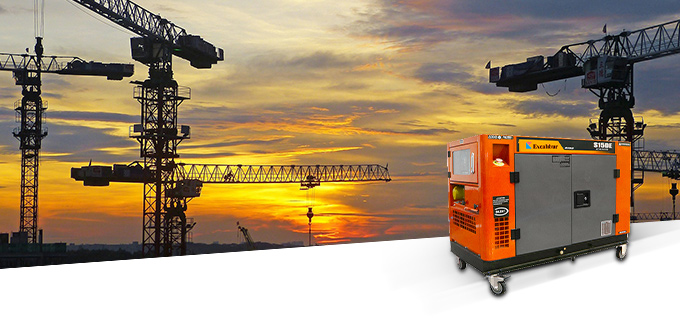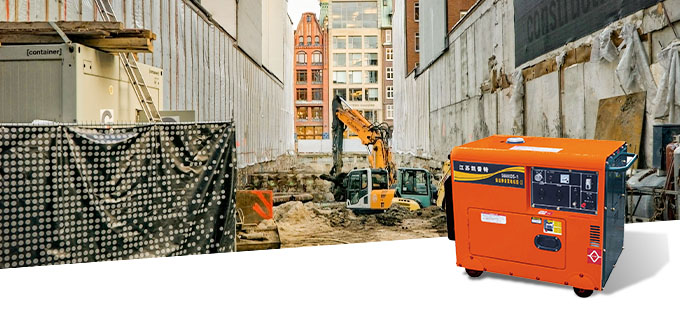Construction sites are bustling hubs of activity, requiring a reliable and consistent power source to operate a myriad of tools and machinery. When it comes to generators, two main types dominate the market – traditional generators and inverter generators. Each has its own set of advantages and disadvantages, making the choice between them a crucial decision for construction professionals. In this article, we’ll explore the key differences between traditional generators and inverter generators, helping you make an informed decision for your construction site power needs.
Traditional Generators
Traditional generators, often referred to as conventional or standard generators, have been the go-to power source for construction sites for many years. These generators operate on a simple principle: an engine powers an alternator to generate electricity. The electricity produced is generally AC (alternating current), which is suitable for powering most construction tools and equipment.
Advantages of Traditional Generators
- Cost-Effective: Traditional generators are often more affordable upfront compared to their inverter counterparts. This makes them an attractive option for construction companies working within tight budgets.
- Robust and Durable: These generators are built with sturdy components, making them capable of withstanding harsh working conditions commonly found on construction sites. They are designed to be rugged and reliable, providing consistent power output over extended periods.
- High Power Output: Traditional generators excel in providing high power output, making them suitable for running heavy-duty tools and machinery commonly used in construction.
- Widely Available: Due to their long-standing presence in the market, traditional generators are readily available, and replacement parts are easy to find. This accessibility can be a significant advantage when quick repairs or replacements are necessary.
Disadvantages of Traditional Generators
- Noise Level: One of the notable drawbacks of traditional generators is their noise level. These generators tend to be louder compared to their inverter counterparts, which can be a concern, especially in noise-sensitive environments.
- Fuel Efficiency: Traditional generators are generally less fuel-efficient than inverter generators. They may consume more fuel to generate the same amount of power, leading to increased operational costs over time.
Inverter Generators
Inverter generators represent a more recent innovation in the realm of portable power sources. These generators use advanced technology to convert AC power to DC power and then invert it back to clean and stable AC power. The result is a more precise and consistent power output suitable for powering sensitive electronic devices.
Advantages of Inverter Generators
- Fuel Efficiency: Inverter generators are known for their fuel efficiency. The ability to adjust the engine speed based on the required load allows them to consume less fuel, leading to cost savings in the long run.
- Quiet Operation: Inverter generators operate at lower noise levels compared to traditional generators. This is a significant advantage, especially in construction sites located in residential areas or noise-sensitive environments.
- Compact and Portable: Inverter generators are typically more compact and lighter than traditional generators, making them easier to transport and maneuver on construction sites with limited space.
- Clean Power Output: The clean and stable power output of inverter generators makes them ideal for powering sensitive electronic equipment. This is crucial on construction sites where precision tools and electronics are commonly used.
Disadvantages of Inverter Generators
- Higher Initial Cost: Inverter generators tend to have a higher upfront cost compared to traditional generators. However, the increased fuel efficiency and other benefits may offset this initial investment over time.
- Limited Power Output: While inverter generators are suitable for a wide range of applications, they may not provide the same high power output as traditional generators. This limitation can be a drawback on construction sites with heavy power requirements.
Choosing the Ideal Generator for Construction
The choice between traditional generators and inverter generators ultimately depends on the specific needs and priorities of the construction site. Consider the following factors when making this crucial decision:
- Power Requirements: Assess the power needs of your construction site. If you require high power output for running heavy machinery, traditional generators may be more suitable. For projects with lower power demands and a focus on fuel efficiency, inverter generators may be the better choice.
- Noise Considerations: Evaluate the noise regulations and sensitivities of the construction site surroundings. If noise reduction is a priority, inverter generators offer quieter operation, making them a more suitable option for urban or noise-sensitive environments.
- Portability and Space: Consider the available space on the construction site and the need for portability. Inverter generators, being more compact and lightweight, are easier to transport and maneuver in tight spaces.
- Budget Constraints: Assess your budget constraints and long-term cost considerations. While traditional generators may be more budget-friendly upfront, inverter generators’ fuel efficiency may result in lower operational costs over time.
Both traditional generators and inverter generators have their merits, and the ideal choice for construction sites depends on specific requirements and priorities. Understanding the advantages and disadvantages of each type will empower construction professionals to make informed decisions that align with the demands of their projects. Whether it’s the robust reliability of traditional generators or the fuel efficiency and clean power output of inverter generators, the right choice can enhance efficiency and productivity on construction sites.




